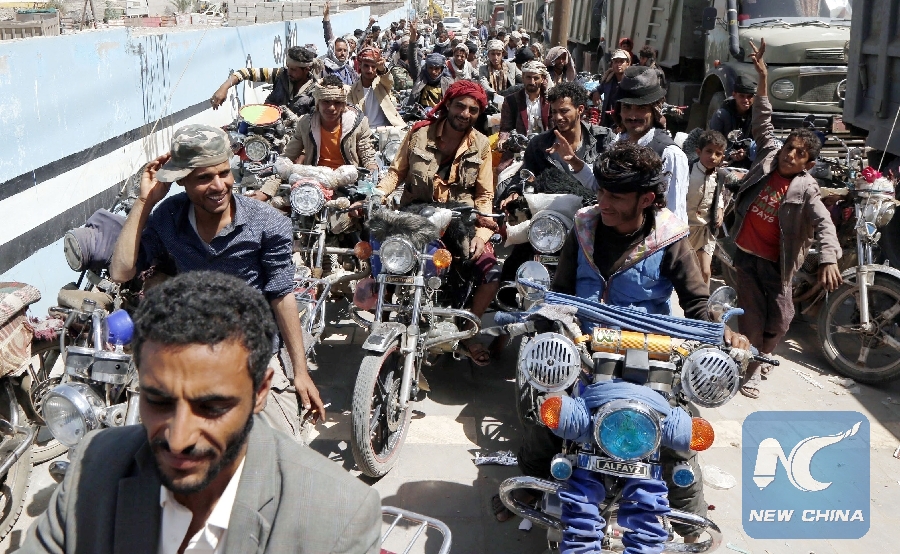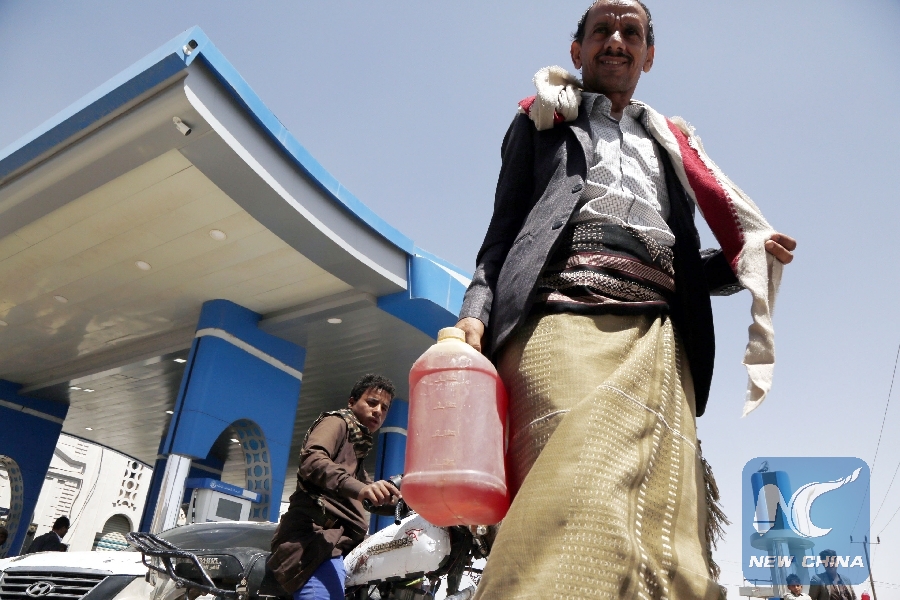
Bikers wait to refill their motorcycles at a petrol station in Sanaa, Yemen, on Sept. 17, 2018. (Xinhua/Mohammed Mohammed)
by Mohamed al-Azaki
SANAA, Sept. 18 (Xinhua) -- Streets are almost empty in Yemen's capital Sanaa as a week-long severe fuel shortage forces hundreds of thousands of vehicles to silently die off the roads, in a scene that turns the busy city into a ghost town.
On the roads, other thousands of vehicles and motorcycles line up in long queues in front of few operating gas stations, but with most drivers failing to get some liters at the end of each day.
The major fuel crisis was triggered by the escalating war earlier this week in the country's strategic Red Sea port city of Hodeidah following the collapse of peace talks brokered by the United Nations in Geneva between Yemeni warring parties.
The fighting between Sunni government forces backed by a Saudi-led coalition and Shiite Houthi rebels allied with Iran has turned the port city into a military zone and completely blocked imports to the rebel-controlled densely populated cities in the north, including Sanaa.
Yemeni rial has sunk to its most lowest rate against foreign currencies in three years, skyrocketing food prices to the highest level.
"We are dying..," said Mohammed Sigher, a taxi owner who has been lining up in front of a petrol station for three days waiting for his turn to fill his car up. "This is a mass genocide," he huffed.
One liter of petrol is traded now in Sanaa at 425 Yemeni rials (one U.S. dollar equals 650 rials), up from 150 rials at the time before the civil war erupted in March 2014 when one U.S. dollar was traded at 250 rials.
"If you are in extreme need, 20 liter of petrol is sold at 20,000 rials easily at the black market..but no more people are now able to afford the big price," Sigher said.
"I need to fill my taxi.. I need to work to feed my children and pay rent of the apartment," Sigher, the father of four, screamed in pain while standing behind crowds of vehicles' owners waiting at the pump.
There is no alternative way for Sigher rather than to wait and wait around the clock under the sun, dust and cold wind until his turn comes.

A man carries a bottle of petrol at a petrol station in Sanaa, Yemen, on Sept. 17, 2018. (Xinhua/Mohammed Mohammed)
The 35-year-old father was a teacher in a public school. But like hundreds of thousands of civil servants in the rebel-controlled northern provinces, he has been not paid since the war engulfed the poor Arab country more than three years ago.
Dozens of people could be seen walking on the main streets as most of public transportation vehicles have run dry of fuel.
"Late yesterday night, I returned back home walking one hour on my feet because there was no public transportation or taxis," Nashwan al-Marwan, 50-year-old restaurant worker, told Xinhua.
In the government-controlled southern cities, including Aden, thousands of people went to the streets over the past two weeks to protest against the harsh increase of food prices and acute deterioration of the local currency rial.
Prime Minister Ahmed Obaid bin Daghr has warned that the worsening economic situations could cause unprecedented humanitarian and political catastrophes, blaming the war and black markets for the crisis. He said his government would take crucial procedures to tackle the crisis.
Back in the rebel-held Sanaa, Mahir al-Eyani, the owner of a petrol station, said "I had paid 3,800,000 rials to the (rebel-controlled) authorities as fees last month to let my petrol tanker enter the capital Sanaa."
"After the war raged on in Hodeidah port, I have now only one way to import oil, which is from the eastern oil-rich neighboring country of Oman and that week-long drive will cost me thousands of dollars as I will not get any profits if I sell a liter at 425 rials," al-Eyani told Xinhua. "Therefore, I closed the station," he added.
Last week, the World Food Programme (WFP) said it was "extremely concerned about the series of security incidents in Hodeidah city these past few days in and around deconflicted sites critical for the humanitarian response in Yemen."
The UN agency warned the situation in Hodeidah is "alarming," saying "the conflict is threatening the continuity of humanitarian assistance to the city and surrounding areas where needs are among the highest in the country."
WFP spokesman Herve Verhoosel told reporters in Geneva that "the ongoing clashes could jeopardize the shipments of 46,000 tonnes of wheat expected to arrive to Hodeidah within the next ten days."
Hodeidah port is the entry point of about 70 percent of the country's food, medicines, aid and fuel.
Yemen's war has killed over 10,000 people, mostly civilians, displaced three million and threatened more than 20 million population with mass famine.
Saudi Arabia is leading an Arab military coalition that intervened in Yemen in 2015 to support the government of President Abd-Rabbu Mansour Hadi after the Houthi rebels forced him into exile.

